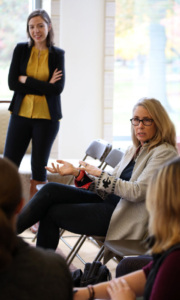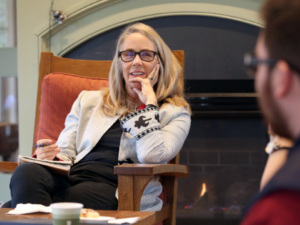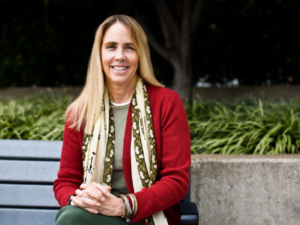Alicia Shepard’s legacy as a ‘journalist’s journalist’ and news literacy champion
 The vantage point from which journalist Alicia C. Shepard witnessed the world was both stunningly heartfelt and sharply intelligent — a filter that colored her career, her life, and her extensive work as one of the earliest classroom volunteers for the News Literacy Project.
The vantage point from which journalist Alicia C. Shepard witnessed the world was both stunningly heartfelt and sharply intelligent — a filter that colored her career, her life, and her extensive work as one of the earliest classroom volunteers for the News Literacy Project.
“She was a journalist’s journalist,” said NLP Founder Alan C. Miller. “She was smart, tough and uncompromisingly honest.”
Shepard died April 1 from lung cancer. She was 69 and is survived by her husband, David Marsden, and son, Cutter Hodierne, from her first marriage.
Known to friends as “Lisa,” she served as NPR ombudsman from 2007 to 2011. By then, her byline was well known from her work at Scripps League Newspapers, the San Jose Mercury News, and the American Journalism Review. Her book, Woodward and Bernstein: Life in the Shadow of Watergate, further secured her position as a thought leader in the industry.
Grace under pressure
A few years after NLP’s founding in 2008, Shepard met Miller and became one of scores of journalists to enthusiastically volunteer to go into middle and high schools in the Washington D.C., region, New York City and Chicago for the organization’s foundational classroom program.
“We told the journalists to think of the students as consumers of news and other information and to give them the tools to determine what to trust, what to share and what to act on,” Miller said. “Lisa totally got this.”
 This was never more evident than the day she visited Bethesda Chevy Chase High School in a Maryland suburb of Washington, where, by all accounts, Shepard showed incredible grace under pressure.
This was never more evident than the day she visited Bethesda Chevy Chase High School in a Maryland suburb of Washington, where, by all accounts, Shepard showed incredible grace under pressure.
The class proved to be an ordeal as two of the students were so disruptive, they were sent home.
“Lisa was not thrown. She didn’t miss a beat,” Miller said. “She sought to bring them into the discussion and proceeded with her presentation that day, and beyond, with the intensity and intelligence that were her trademarks.”
Shepard’s involvement had a significant impact on Darragh Worland, who had just joined NLP as coordinator of the New York City classroom program and witnessed firsthand Shepard’s skillful handling of the challenging classroom situation.
“The Venn diagram between skills inherent in journalists and those in teachers overlaps considerably,” said Worland, who is now NLP’s senior vice president of creative strategy. “A lot of it is explaining complex concepts, breaking them down. She brought that sort of heft to the organization.”
Dispatches at sea
Shepard earned a bachelor’s degree in English literature from George Washington University in 1978 and began her career as a journalist in the Washington bureau of Scripps League Newspapers.
Following a move to California and five years as a reporter at the San Jose Mercury News, she and her first husband sold their belongings and purchased a boat, embarking on what would become a three-year journey in the South Pacific with their 9-month-old son.
Throughout the trip, Shepard filed dispatches with the Mercury News and The Washington Post. Then, after two years as a teacher in Japan, she returned to the United States, settled in Arlington, Virginia, and continued writing, taking on such controversial topics as the use of anonymous sources and lucrative speaking fees for journalists for the American Journalism Review.
In 2002, she earned a master’s degree in journalism from the University of Maryland and that same year, co-authored Running Toward Danger: Stories Behind the Breaking News of 9/11 for the Newseum, commemorating the work of journalists covering the 2001 terrorist attack.
“She embodied the highest ideals of a standards-based news organization,” Worland said. “To have someone like her speaking on behalf of NLP and educating students is one of the reasons the organization has the esteem that it does.”
A natural educator
Shepard was a natural educator. Over the years, she taught at Georgetown University, American University, Duke University, the University of Texas at Austin, the University of Nevada at Las Vegas, the University of Arkansas, and California Polytechnic State University.
She was a longtime proponent of the need to increase diversity in journalism. She volunteered for about a decade each summer to teach students the basics of journalism through the Urban Journalism Workshop, sponsored by the Washington Association of Black Journalists.
Prior to one of her initial classroom visits for NLP, Shepard asked the teacher to instruct the students to find out everything they could about her. When Shepard asked the students what they had discovered, one named the street on which she lived, another said she currently taught at American University and a third said she had attended her high school reunion. All three statements were wrong.
“You absolutely have to check out all information and make sure it’s accurate,” Shepard told the surprised students. She then shared the journalistic maxim “If your mother says she loves you, check it out.”
Hodierne, 36, and a filmmaker, said this was “a prism into how she saw the world.” He recalled that she constantly asked others, “How do you know that?”
Legacy Society bequest
 Beyond her presence in the classroom, Shepard demonstrated support for NLP in other ways. In 2012, she brought her talents to a cooperative project with the American Library Association and subsequently traveled to Beirut, Lebanon to explore creating a news literacy training program at several universities in collaboration with the ALA. She also wrote about NLP and media literacy.
Beyond her presence in the classroom, Shepard demonstrated support for NLP in other ways. In 2012, she brought her talents to a cooperative project with the American Library Association and subsequently traveled to Beirut, Lebanon to explore creating a news literacy training program at several universities in collaboration with the ALA. She also wrote about NLP and media literacy.
Marsden, Shepard’s longtime partner whom she married in 2021, said that her work with NLP was a logical extension of a career focused on journalism and ethics and education. “She always seemed to come back to news literacy,” he said. “She felt very proud of the way [NLP] was growing and expanding.”
In 2014, Shepard became a monthly donor to NLP, a process that continued until her passing — making hers one of the longest-running commitments in the history of the organization. She is recognized as a member of NLP’s Legacy Society as well, after having bequeathed a portion of her estate to the organization.
“Lisa engaged, inspired, and informed scores of educators and students as a passionate advocate for news literacy,” Miller said. “Her generous bequest will now support NLP’s work as the final piece of her meaningful legacy with us.
The Moore family and NLP: A leap of faith and a legacy gift
In January 2009, philanthropists David and Katherine Moore took a leap of faith in me and the News Literacy Project when they became one of our first individual donors, despite the fact that we had yet to provide a single classroom lesson.
The Moores have been part of the NLP family ever since, making annual donations without fail. Following David’s death in 2011, Katherine took up our cause. This year, at her behest, the family gave NLP an exceptionally generous $500,000 advanced bequest to create an endowment. David’s and Katherine’s son, Richard, delivered the news.
“The News Literacy Project has been extremely important to my father and mother,” he said. “As a result, my mother wants to provide this special gift.”
NLP is using the funds to launch The David and Katherine Moore Endowment. This is a cornerstone of NLP’s newly created Legacy Society to recognize and thank those who are including NLP in their estate planning.
I’m tremendously grateful for the Moore family’s deep commitment to news literacy, and for the deeply meaningful friendship that David and I shared. Here is our story.
The first time I met David, I asked him for money.
“Alan,” he responded, seemingly taken aback, “This is our first date. You can’t ask for money yet!”
The year was 2008. Following a 29-year career as a journalist, I had just launched NLP. I had a lot to learn. David was one of those who would teach me.
As it turned out, this would be the first of many memorable lunches with David at the stately Harvard Club in midtown Manhattan, following an introduction by a family friend. It would also be the last time that David would decline my request for money.
In the years that followed, as David and I became friends, I relished our encounters.
Then in his mid-80s, David took the train in from a New York suburb for our lunches and other events as an active member of our New York advisory committee. He and Katherine visited our first high school partner in New York’s Hell’s Kitchen to watch David Gonzalez of The New York Times, who was our initial volunteer journalist fellow, alternate between English and Spanish as he powerfully connected with the students.
David Moore’s support was profoundly meaningful for another reason: He was the grandson of Joseph Pulitzer (I won the Pulitzer Prize for National Reporting with the Los Angeles Times in 2003).
With journalism in his blood, David did it all: He worked as a reporter; he founded an independent weekly and a magazine; he served as editor-in-chief of two publications, and he was active on the board of various journalism nonprofits. Among his most cherished causes were ethnic community news outlets and the Pulitzer Center for Investigative Journalism.
In NLP, David saw a chance to make a difference by building an appreciation for journalism and by educating the next generation, particularly in New York’s underserved communities.
David was invariably sharp, inquisitive and engaged. In 2010, he showed up for lunch with a copy of a long story about NLP. He had circled a reference deep in the piece about our plans to build upon our initial classroom program to create a digital unit and begin to move to scale.
“Why didn’t you tell me about this?” he asked. Another lesson: No surprises for David.
When David died in 2011 the age of 88, Katherine took up the NLP mantle in his honor. In 2014, she increased the family foundation’s yearly gift to NLP from $25,000 to $35,000, for an annual giving total of $445,000 since 2009.
I believe David would be extremely proud of how far NLP has come since that first lunch in 2008. The family’s most recent gift underscores that the project, and its growing impact, will be around for a long time to come.